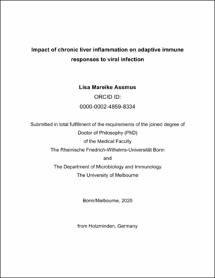Impact of chronic liver inflammation on adaptive immune responses to viral infection

Impact of chronic liver inflammation on adaptive immune responses to viral infection

| dc.contributor.advisor | Garbi, Natalio | |
| dc.contributor.author | Assmus, Lisa Mareike | |
| dc.date.accessioned | 2020-04-27T20:44:26Z | |
| dc.date.available | 2021-03-15T23:00:18Z | |
| dc.date.issued | 11.03.2020 | |
| dc.identifier.uri | https://hdl.handle.net/20.500.11811/8331 | |
| dc.description.abstract | A common complication in patients suffering from chronic liver inflammation and fibrosis is the enhanced susceptibility to viral infections and weak responses to vaccination, which are associated with significant co-morbidities. To unravel the cellular and molecular mechanisms underlying the impaired adaptive immune response during liver fibrosis, we investigated the T cell-mediated immune responses to lymphocytic choriomenigitis virus (LCMV) infection, as well as in response to OVA/PolyI:C vaccination. Using the bile duct ligation (BDL) murine model of chronic liver inflammation and fibrosis, we found that chronic liver damage is associated with persistence of infection, recapitulating the clinical situation in humans. Hallmarks of the defective anti-viral immunity in these mice were reduced expansion of LCMV-specific CD4+ and CD8+ T cells, decreased expression of IFNγ and TNFα, as well as an elevated co-expression of the exhaustion marker PD1 together with LAG3 and TIM3 in virus-specific T cells from the spleen and liver. The reduced number of LCMV-specific CD4+ and CD8+ T cells are due to decreased proliferation as well as increased apoptosis among SMARTA T cells. Additionally, LCMV-specific CD4+ and CD8+ T cells display reduced mitochondrial fitness, characterized by a higher proportion of cells containing depolarized (i.e. dysfunctional) mitochondria, and producing high levels of superoxide among SMARTA and P14 T cells from mice with liver fibrosis. After OVA/PolyI:C vaccination antigen-specific CD4+ and CD8+ T cells were similarly reduced in numbers in mice with liver fibrosis and displayed reduced production of IFNγ, TNFα and IL-2. Interestingly, endogenous OVA-specific CD8+ T cells, as well as transferred OT-I T cells also show severe signs of exhaustion after vaccination, which manifested in elevated levels and co-expression of PD-1 and LAG3, as well as PD-1 and TIM3 in mice with liver fibrosis. The future goal of this project is to identify key molecular pathways induced by chronic liver damage that can be therapeutically modulated to promote anti-viral immunity and to improve vaccination responses in patients suffering from chronic liver inflammation and fibrosis. | en |
| dc.language.iso | eng | |
| dc.rights | In Copyright | |
| dc.rights.uri | http://rightsstatements.org/vocab/InC/1.0/ | |
| dc.subject.ddc | 500 Naturwissenschaften | |
| dc.subject.ddc | 570 Biowissenschaften, Biologie | |
| dc.subject.ddc | 610 Medizin, Gesundheit | |
| dc.title | Impact of chronic liver inflammation on adaptive immune responses to viral infection | |
| dc.type | Dissertation oder Habilitation | |
| dc.publisher.name | Universitäts- und Landesbibliothek Bonn | |
| dc.publisher.location | Bonn | |
| dc.rights.accessRights | openAccess | |
| dc.identifier.urn | https://nbn-resolving.org/urn:nbn:de:hbz:5-57718 | |
| ulbbn.pubtype | Erstveröffentlichung | |
| ulbbnediss.affiliation.name | Rheinische Friedrich-Wilhelms-Universität Bonn | |
| ulbbnediss.affiliation.location | Bonn | |
| ulbbnediss.affiliation.otherLocation1 | Melbourne | |
| ulbbnediss.affiliation.otherName1 | University of Melbourne | |
| ulbbnediss.thesis.level | Dissertation | |
| ulbbnediss.dissID | 5771 | |
| ulbbnediss.date.accepted | 07.01.2020 | |
| ulbbnediss.institute | Medizinische Fakultät / Institute : Institut für Experimentelle Immunologie (IEI) | |
| ulbbnediss.fakultaet | Medizinische Fakultät | |
| dc.contributor.coReferee | La Gruta, Nicole | |
| ulbbnediss.contributor.orcid | https://orcid.org/0000-0002-4859-8334 | |
| ulbbnediss.date.embargoEndDate | 15.03.2021 |
Files in this item
This item appears in the following Collection(s)
-
E-Dissertationen (2082)




